Germany's Flawed Justice
- Details
- Category: Articles in English
- Published on Tuesday, 26 March 2013 11:51
- Written by Super User
- Hits: 24832
Germany's flawed Justice
Introduction

Government Statements
The National Report
The German Government in its Report to the UN Periodic Review (1) on 10 Nov. 2008 reporting positively on its efforts in the field of Human Rights.
The GIHR
In the same manner, the government-controlled German Institute for Human Rights, in its paper to the UN Periodic Review (2) reported that Germany had "a highly differentiated and effective court system". The translation appears to have been somewhat literal. This is taken to mean, "a highly specialized and efficient court system".
The Aim of this Paper
The purpose of this paper is, to examine the German Justice System (GJS), to see if it could in any way measure up to the positive reports about it. Whilst it is not possible to cover every aspect, enough details are included to achieve the aim. In addition the paper examines the influences on German judiciaries, to see if there are any particular aspects impacting the principle of separation of powers. Lastly the concept of a "Parametric Approach to judicial Accountability" will be briefly introduced.
Flawed Procedures
Since 1879
The missing Separation of Verdict and Sentence
The GJS, as we know it today, has been flawed since its inception in 1879, the year of promulgation of the German Rules of Procedure(GRPs) for civil and criminal trials. There is no separation of verdict and sentence, which leads to muddle and confusion, and cannot possible lead to a fair hearing. A major reform took place in 1924, which abolished the jury system, but did not correct this important aspect.
The simplest example of this, is the existence of Paragraph §243(2) of Criminal GRPs, which has not changed since 1879, when it was then §242(2). The accused person is required to give evidence, in public, of his social circumstances, including his or her income, right at the beginning of the trial. No other witness, who is not an accused person, is required to do this. This is, therefore, a violation of the principle "presumption of innocence", as laid down in Art 6_2 of the Convention. Not only that, it is a violation of privacy, especially should there be a verdict of "not guilty" at the end of the trial. It is also a violation of Germany's Data Protection Laws.
Hearsay and Gossip in Civil Law
In the USA hearsay evidence is forbidden except in exceptional pre-defined circumstances. In England and Wales, although hearsay evidence is admissible, it is governed by the Civil Evidence Act 1995 (here Paragraphs 1 on Hearsay, 2-4 on safeguards relating to hearsay and 5-7 on supplementary provisions relating to hearsay).
In German civil courts, hearsay evidence is admissible, without any control of its quality or reliability. Generally, for family courts, the gossip of a neighbor or openly mendacius evidence can be given priority over real hard evidence, if this suits better. Apart from vague refernces in higher court judgements, there are no checks or safeguards performed to ascertain the reliability of such hearsay statements. This is what makes German civil courts, in every respect, unreliable and unfit for their tasks.
The Summary Penalty Order (SPO)
How it works
Germany's Summary Penalty Order (SPO) or "Strafbefehl", as opposed to a parking fine, is issued direct from a court, as a verdict of guilty, and signed by a judiciary. The SPO has been in use since 1879 ( see Fig0_8). The SPO can contain, for example, a hefty fine or a 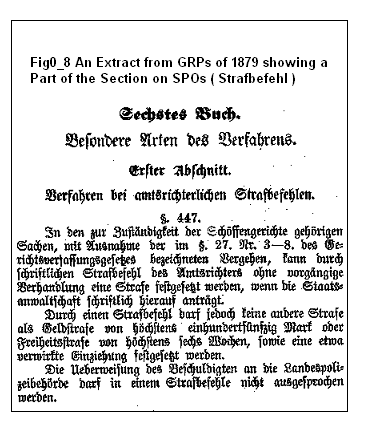 suspended sentence of imprisonment, leading to a criminal conviction. The accused can object to it, in which case a public hearing has to take place, or accept it, in which case, there is no public hearing. (We are, of course, not talking about the exceptional cases, which have to be held in camera anyway).
suspended sentence of imprisonment, leading to a criminal conviction. The accused can object to it, in which case a public hearing has to take place, or accept it, in which case, there is no public hearing. (We are, of course, not talking about the exceptional cases, which have to be held in camera anyway).
Invisible Justice
The procedure in the case of an accepted SPO is part of the invisible mode of the GJS. However, it offends, among other things, against Art 6_1 of the European Convention for Human Rights which prescribes a public hearing. The quality of justice being administered, the detailed discussion of the offenses as well as the demeanor of the accused in the courtroom, are all important factors in the equation of public scrutiny.
The evitability of a public hearing inherent in the procedures of the SPO can be a powerful incentive for an accused to accept an unjust punitive sanction. This phenomenon is also called "Injustice by Sampling", a try-on. If the accused person does not accept the SPO, then the GJS has lost nothing. The SPO can also be the result of collusion between the justice authorities and the accused to achieve an unduly mild sentence.
The Dresdner Bank Affair
Two renowned periodicals, "Spiegel" and "Manager" reported, in March / April 1999, a particularly perverse application of the SPO. The Dresdner Bank had apparently assisted in cases of tax evasion, leading to a loss of tax revenue of several hundred of millions of Marks between 1992 and 1996. The Bank had had to pay a fine, per SPO, of 47 Million Marks. Of course an SPO has to have a name on it, so it would be logical to assume that someone was given incentives to take the blame. The lottery prize was retirement, with the stain of a conviction, but also an extra big golden handshake to compensate the "victim". As it happened, the CEO held his head - and his hand - out.
The SPO had shown itself to be, in addition to its many other vices, a shameful secret bazaar, where every well-to-do crook can buy his way out of trouble. The general public gets no details of the alleged offenses or the modalities of their commission.
The political Justice
Membership in political Parties
Heinrich Sennff in his book (3) "Richter und andere Bürger", as well as others, speak of Germany's "Political Justice", even from before 1879. Today German judiciaries are still allowed to meddle actively in Politics. It is thus, by no means, frowned upon, or unusual, that Judiciaries are members of political parties. Many of these openly flaunt this membership and use it as a means of furthering their careers and / or indulging in corrupt activities. This is a violation of the UN General Assemby Resolutions 0/32 of 29.11.85 and 40/146 of 13.12.85 on the independence of the judiciary.
Membership by judiciaries in political parties in not permitted either in England & Wales(here P.9 para 3.3) or in the USA(here Canon 7) or in many other countries like Mauritius (here Para 1.8).
The politically-based Selection Procedures
Today judiciaries for the higher courts in Germany are selected on a political party quota system. This is regulated by Art 94 & 95 of the German Basic Law. This is of course an open invitation to abuse and, indeed, there is enough of that in the system.
At a lower level, the process of selection and career development is controlled by the justice ministers of the 16 German states. With some slight stately variations the composition of the Judiciary selection committee is laid down by state laws. The selection committees, with the exception of that of Hamburg, are generally composed of a basis of state parliamentarians with a minority of citizens. If the "citizens" are also party members, selection of judiciaries can be a 100% political matter. Thus the GJS is dependent on both the Legislative and the Executive.
The Nazi Era
Perversion of Justice 1933-1945
It is hardly surprising, that perversion of justice should be a way of life in such a system. This was so in 1879 and is certainly the case today. Whilst the National Socialists ( 1933-1945) certainly did not invent this heinous crime, they merely "improved" on an existing situation. The mentality necessary for those crimes which in 1933 were yet to be perpetrated, was already present in a justice tradition stretching back to 1879 and earlier.
Looking at the crimes, about 5.200 executions were ordered by the notorious Volksgerichtshof and upwards of 22.000 were carried out by the Wehrmacht, according to Manfred Messerschmitt in his book, "Die Wehrmachtjustiz 1933-1945"(4) during the Nazi era. ( The Jews and mentally retarded citizens, numbering about 6 Million, were disposed of by lists and, as a result, do not feature here ). Just to take a sample case, the renowned journalist Erich Knauf was sentenced to death for cracking Hitler jokes in a shelter during an air raid in 1944. He was brutally executed in March 1944, and his widow had to pay for the whole execution procedure.
The postwar Perversion of Justice
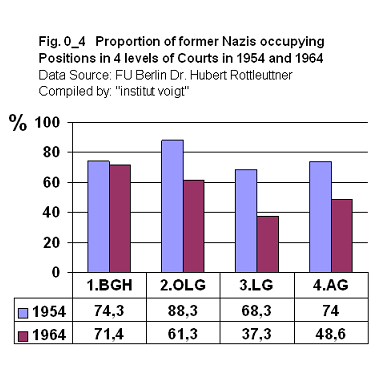 The process of denazification in Germany was treated differently in 4 Zones of occupation, and ended in 1948. This process was relatively easy to circumvent and even people with tainted records were able to collect "Persil Certificates" to offer up to the authorities as "proof" of an unblemished career. Together with the "Persil Certificate", this was the way back, for the Nazi judiciaries, into the judicial system or, at the very least, a fat pension.
The process of denazification in Germany was treated differently in 4 Zones of occupation, and ended in 1948. This process was relatively easy to circumvent and even people with tainted records were able to collect "Persil Certificates" to offer up to the authorities as "proof" of an unblemished career. Together with the "Persil Certificate", this was the way back, for the Nazi judiciaries, into the judicial system or, at the very least, a fat pension.
The people, who had perpetrated these crimes were restored to office between 1950 and 1954. Rolf Bossi, an Attorney with over 50 years experience describes, in his book "Halbgötter in Schwarz"(5), how this happened: He names "The 131 Law", introduced in 1951, which in combination with Art 131 of the German Constitution, opened the door to Nazi Judiciaries to be reinstated as officials.
Poignantly, Bossi writes, that the German Nazi officials, including the judiciaries, were the only "victims of Nazi repression", who were ever compensated by the Federal republic.
Fig0_4 shows the occupation of judicial appointments in 4 levels by ex-Nazis over a 10 year period, 1954-1964. There is some wastage due to old age and taking up of other appointments. It is, however astonishing, that the figures for 1964 show a somewhat reduced, but yet still decisive influence of old Nazis in the GJS.
Allied courts in Nuremberg convicted the only Nazi judiciaries to have been punished on German soil. 10 defendants were convicted, 4 acquitted (one defendant died before verdict and a mistrial was declared in one case). After 1947 the prosecution of Nazi judiciaries was handed over to the German authorities. Since then, not one single judiciary or prosecutor was ever convicted.
Rewards for Criminals
As if to add insult to injury, many of the judiciaries in the statistics of Fig0_4 had been convicted and sentenced for murder in other countries. For example Adolf Raderschall was sentenced in his absence to death by a court in Luxembourg. This did not prevent his appointment to the Regional Court in Rheinland-Pfalz. The bloodthirsty judiciary of Prag, Dr. Kurt Bellman, was sentenced to life imprisonment in Checkoslovakia, but later expelled and repatriated to the Federal Republic, where he was promptly rewarded with a job as a director of the Regional Court in Hannover by the German authorities.
This rewarding of the guilty by the German Government can be extrapolated further: Had the allies, for example, not been there to prevent such a business, there is no doubt, whatsoever, that Hermann Göring would have been the Federal Republic's first postwar chancellor.
Bossi suggests that the Allies should have retained control of the Justice for much longer, replacing it with their own. Whether or not the justice systems of the Allies had sufficient resources to serve Germany in addition to their own needs, appears doubtful. If it could have worked, then a big opportunity was missed.
The Nazi Doctrine of Excess
The Nazi era was not in any way the most important milestone in Germany's judicial history. The behavior of the judiciaries, in those times of intemperance, showed only their true potential for unbounded excesses. The perversion of justice, to the extent necessary to uphold the postwar situation, as it is depicted in Fig0_2, has destroyed the credibility of the GJS for generations yet to come.
The present day German judiciaries need no lessons from the Nazis: They are merely continuing with the traditions started by the German Reich since 1871. The Nazi Era was characterized rather by a "Doctrine of Excess", in a justice system already created for them. A similar doctrine of excess can be seen today in the GJS of the Federal Republic ( see for example the penultimate section below).
Contempt for Human Rights
Human Rights in Practice in Germany
Distribution Statistics
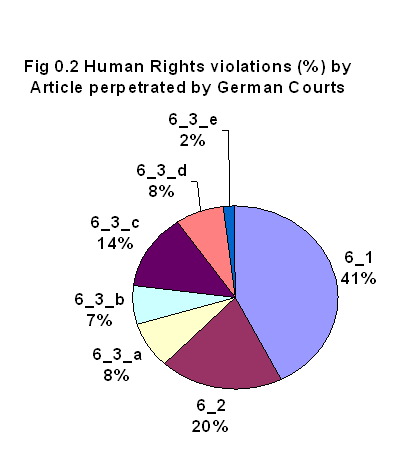 Germany's open contempt for the European Convention for Human Rights continues to find expression in the multiple violations of it in any given hearing.
Germany's open contempt for the European Convention for Human Rights continues to find expression in the multiple violations of it in any given hearing.
Fig 0.2. Shows the actual Situation, regarding violations, by proportion(%) and article no. The Data comes from a centralized Human Rights database, to which people contribute their case data.
| ART | Content |
| 6_1 | The right to a fair hearing |
| 6_2 | Presumption of innocence |
| 6_3_a | Information on the charges |
| 6_3_b | Opportunity to prepare defense |
| 6_3_c | Right of Representation. |
| 6_3_d | Universal rules of evidence. |
| 6_3_e | Right to an interpreter |
Systematic Violations
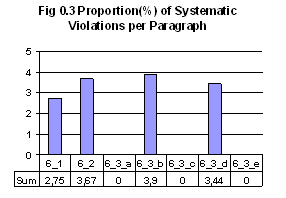
The amount of systematic violations of the European Convention for Human Rights in the system, is dictated by the defects of procedure, e.g. Paragraph 243(2), mentioned earlier on, which are perpetrated by the GJS during every hearing, are illustrated in Fig0_3.
These systematic violations always occur and amount to about 7% of all the possible offenses against the European Convention. The other 93% is due to the contempt of individual judiciaries for the convention and for human rights themselves.
The existence of systematic violations in the procedures is further indication of an urgent need for reform.
The German Abrogation of the ECHR
Germany has abrogated the European Convention for Human Rights. In a judgment of the Supreme Court of the 14.10.2004 ( here ) she said (under bookmark 18) that the rulings of the European Court of Human Rights are not binding on any German Courts. This was merely an "outing" because Germany has never observed the Convention, probably because, with the GRPs in their present state, she is unwilling and unable to change anything. Looking at the arguments put forward to justify the outrageous non-compliance with international treaties, the statement:
As a result of the status of the European Convention on Human Rights as ordinary statutory law below the level of the constitution, the ECHR was not functionally a higher-ranking court in relation to the courts of the States parties. For this reason, neither in interpreting the European Convention on Human Rights nor in interpreting national fundamental rights could domestic courts be bound by the decisions of the ECHR.
contains a in any case a falsehood: Art 46 of the convention does not apply any ranking to the decisions of the European Court of Human Rights, it simply says that they are to be obeyed. An argument based on internal organization is, in any case, a huge non sequitur, but typical of the kind of pseudo-judicial argumentation to be expected of German courts.
By contrast, Britain passed the Human Rights Act of 1998 (here), making it illegal for any public body to act in a way incompatible with the Convention. As the 1997 white paper "Rights Brought Home" (here) stated,
It takes on average five years to get an action into the European Court of Human Rights once all domestic remedies have been exhausted; and it costs an average of £30,000. Bringing these rights home will mean that the British people will be able to argue for their rights in the British courts - without this inordinate delay and cost.
Seeking a domestic remedy in Germany will land anyone, after a battle of about five years duration, before the Supreme Court of the German Constitution (SCGC). The SCGC is, for the citizen, a treacherous, inconsistent and hostile public body, which pays no attention to the Convention, or any other kind of right, whatsoever. The decision of 14.10.2004 (above) is a monument to its attitude. What in England is a matter for the first instance, is in Germany a ten year odyssey to Strasbourg - and then the GJS will not recognize the judgments of the European Court of Human Rights anyway.
The statement contained in the National Paper (1) Part C, "Furthermore any individual who feels his basic rights have been infringed may appeal to the Federal Constitutional Court through the lodging of a constitutional complaint." is in the light of the preceding paragraphs, is a silly, fatuous and medacious argument. The only way to safeguard the Human Rights of the citizen is to include the European Human Rights Convention in the GRPs. That way, the matter would be discussed at the first hearing and not 10 years later - only to hear the probable pseudo-judicial arguments as to why the decision of the European Court of Human Rights is not applicable.
These violations of Human Rights are hidden from international view, because they are perpetrated mostly at the first instance. These below-the-radar tactics of the GJS are well-known only in Germany. It remains to make sure that the international community also gets a good view of them, which, in these days of enhanced communications, should not be too difficult.
The Quality of Courts and their Experts
The Experts
Incompetence and malice of judiciaries are exchangeable qualities leading to the same result in court. This phenomenon is known as Modersohn's alternatives. Because it is little use, to try and pursue a German judiciary for any misdemeanors committed, these are assumed to arise from incompetence and a parametric approach is used. This is best explained using examples.
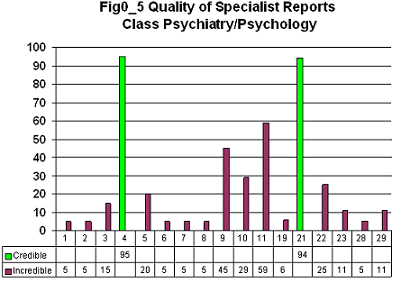 A system of assessment which is in essence Quality management(QM), without the specialist topics, has been set up to evaluate specialist reports. The elimination of the specialist topics accords with the investigation techniques of the Royal Air Force. The resulting avoidance of interminable specialist discussions is a big advantage. Another big advantage is that the same procedure can be used, no matter what the specialization is. The QM assessment basically asks the question "Is the specialist at all capable of writing a lucid and coherent report ?"
A system of assessment which is in essence Quality management(QM), without the specialist topics, has been set up to evaluate specialist reports. The elimination of the specialist topics accords with the investigation techniques of the Royal Air Force. The resulting avoidance of interminable specialist discussions is a big advantage. Another big advantage is that the same procedure can be used, no matter what the specialization is. The QM assessment basically asks the question "Is the specialist at all capable of writing a lucid and coherent report ?"
For the expert assessment an 18 point yes/no questionnaire was devised and applied to the reports. The results, together with the percentage marks achieved, are shown in Fig0_5 (not all of the 29 reports are shown). These results are devastating: Less than 7% of the reports reviewed so far, were in any way credible. We noted with satisfaction the two good reports (95% and 94%, both credible). These show that the moderate standards set are indeed achievable, otherwise one must get the impression of widespread illiteracy. The abysmal standards of the majority of the reports is self-evident from the plots.
Further Interpretation
The Effects
It must be said, that Fig0_5 depicts the results, not of just an academic exercise, but of real cases. These specialist reports, in all but one case, have to do with tasking by family courts. On the basis of such, mostly amateurish, expertises, families are torn apart, children put in orphanages, psychiatric clinics and their parents declared unfit to raise children. As the reports had been accepted by the courts, we have the irrefutable evidence, that the courts cannot possibly have understood them. The family courts in Germany regard themselves, in any case, as the extended arm of Germany's notorious "Jugendamt" which, as a 21 Billion Euro business, deals with youth matters. ( See "Child trafficking in 21st Century Germany") (6).
The Courts as Tasking Agencies
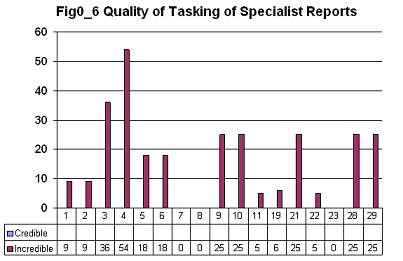 The courts or, exceptionally the Jugendamt, are responsible for the tasking of expert reports for presentation to the courts. Fig0_5 shows the results of an exercise to assess the quality of the tasking agency, in this case, the courts. Experts are selected by the Judge, and, as far as can be established, the only qualification is that the expert should be well known to the judge. In none of the cases were the qualifications and experience required of the expert stated.
The courts or, exceptionally the Jugendamt, are responsible for the tasking of expert reports for presentation to the courts. Fig0_5 shows the results of an exercise to assess the quality of the tasking agency, in this case, the courts. Experts are selected by the Judge, and, as far as can be established, the only qualification is that the expert should be well known to the judge. In none of the cases were the qualifications and experience required of the expert stated.
The cases are identical to those in Fig0_5. In none of the cases could the minimum ingredients of a tasking be found. In none could the tasking be classified as satisfactory or credible.
The specialist is duty bound to clarify any queries with the tasking agency. If this did not happen, then the report is marked adversely on the point in question.
The results are comparable with those of Fig0_5 - just worse. It is a great irony that the same judiciaries are likely to be deciding on contractual disputes, when at the same time they are incapable of defining a simple task.
The parametric Approach to judicial Accountability
These two assessments are part of a parametric approach to judicial accountability, a subject which will be discussed in a separate article. Rolf Bossi's remarks on the standard of court documentation are relevant here. However, he approached the problem from another angle, but arrived at the same conclusion. While he also uses a parametric approach at times, he has generally bound himself to judicial procedures in a direct approach. The assessments in Fig0_5 and Fig0_6 are not judicial procedures and are not bound to the time-line of any process.
The Doctrine of Excess Today
General
If, in a streetcar, in some foreign country, one sees a notice, warning passengers of the penalties for spitting on the floor or in an elevator, warning against similar sanctions, for urinating in this public utility, then it is safe to assume that such things occasionally happen.  The same sort of thing applies to the laws on "insult" in Germany, which are there because some people occasionally feel that they have been " insulted".
The same sort of thing applies to the laws on "insult" in Germany, which are there because some people occasionally feel that they have been " insulted".
Every trivial mishap is, in German, a catastrophe. Whether the river has burst its banks and a huge wave is rapidly approaching, or the newspaper has not been delivered on a particular day, the same word is used. Occasionally, people want to express themselves forcefully, in a dispute and, finding no suitable expressions, because German is the language of exhausted superlatives, some of them resort to the "insult".
Whether the "insult" is equivalent to being "taken short" in the elevator, is doubtful. The "insult" is generally short-lived but the "fragrance" in the elevator is likely to remain in the air for some time, and being shut up with it, through say 40 floors of travel, could be quite an experience.
Fig0_7 shows the yearly growth of Germany's infantile "insult" industry, showing a steady growth rate, over 10 years to a staggering 193.092 cases in 2007. Whilst many EU countries still maintain criminal laws against insult, Germany leaves them all standing with sheer numbers. Although in Britain the offense of criminal defamation originated as "scandulum magnatum", was created by statute in 1275. The offense may not have been prosecuted in anger in that country since 1971. Its mere presence on the statute book, however, lends a veneer of respectability to other states' criminal codes, including that of Germany, that include imprisonment as a punishment for libel or slander.
Many German judiciaries only need a small excuse to behave in accordance with old traditions. Criminal defamation is right up their street. It appeals to their fundamental lack of maturity and has the added advantage of discouraging open criticism. As far as can be ascertained, most of the cases could only be classed as "bad manners", which is not punishable under law, even in Germany, and convictions can only be achieved through perversion of justice, which is the perfect crime in Germany.
It is abundantly clear, that Germany through its political judiciaries is systematically attacking freedom of expression. This doctrine of judicial excess, which only needs a small stretch of the imagination to be compared with that used in the case of Erich Knauf (see above under Nazi Era) is being vigorously applied, in a concerted effort.
The Conclusion
Fulfillment of the Objectives.
The Government
The statements in (1) do not bear any resemblance whatsoever to the realities of Human Rights observance in Germany, which in any case does not accept the authority of the European Court of Human Rights, either officially (since 14.10.2004) or in practice. The statements can only be interpreted as the propaganda of a state, which has much to hide. How long this facade can be maintained, is anyone's guess. However, that can only be a matter of time.
The GIHR
There is no truth, whatsoever, in the statement of the GIHR (2) that Germany had "a highly differentiated and effective court system". Quite the opposite has been proved to be true.
Additional Remarks
The unsafe and unsound Justice
Germany is operating a system of justice, whose decisions, due to:
the political influence on its judiciaries,
its effective abrogation of the European Convention on Human Rights,
the extremely poor quality of its workmanship,
its unconvincing record in prosecuting perversion of justice,
its hugely defective procedures,
can only be classed as extremely unreliable. International treaties and norms, which depend on the GJS, should be reviewed to ascertain the true extent of Germany's non-compliances.
The parametric Approach to judicial Accountability
From the point of view of the non-government-influenced NGOs, any general proposals for improvement would be out of place. There is simply too much wrong with the tumble-down system and nobody would want to make himself an "accessory after the fact" by pointing to ways out of the situation. That is a problem for the GJS.
Instead a quality-based parametric approach to judicial accountability is being developed. This involves disassociation from the time-line and concentation on certain key areas of GJS vulnerabiliy. That is, however, a story for another time.
Peter Briody
28.12.2008
Copyright (c) 2008
Literature:
| Title | Link |
| 1. National Report A/HRC/WG.6/4/DEU/1 dated 10 Nov. 2008 | ( Link ) |
| 2.GIHR_GER_UPR_S4_2009_GermanInstituteforHumanRights_NHRI | (Link) |
| 3. Heinricht Senfft "Richter und andere Bürger | ISBN 3_89190-957-9. |
| 4. Manfred Messerschmitt "Die Wehrmachtjustiz 1933-1945" | ISBN 3-506-71349-3 |
| 5. Rolf Bossi "Halbgötter in Schwarz" | ISBN 3-8218-5609-2 |
| 6. "Child Trafficking in 21st Century Germany", Peter Briody | ( link ) |
